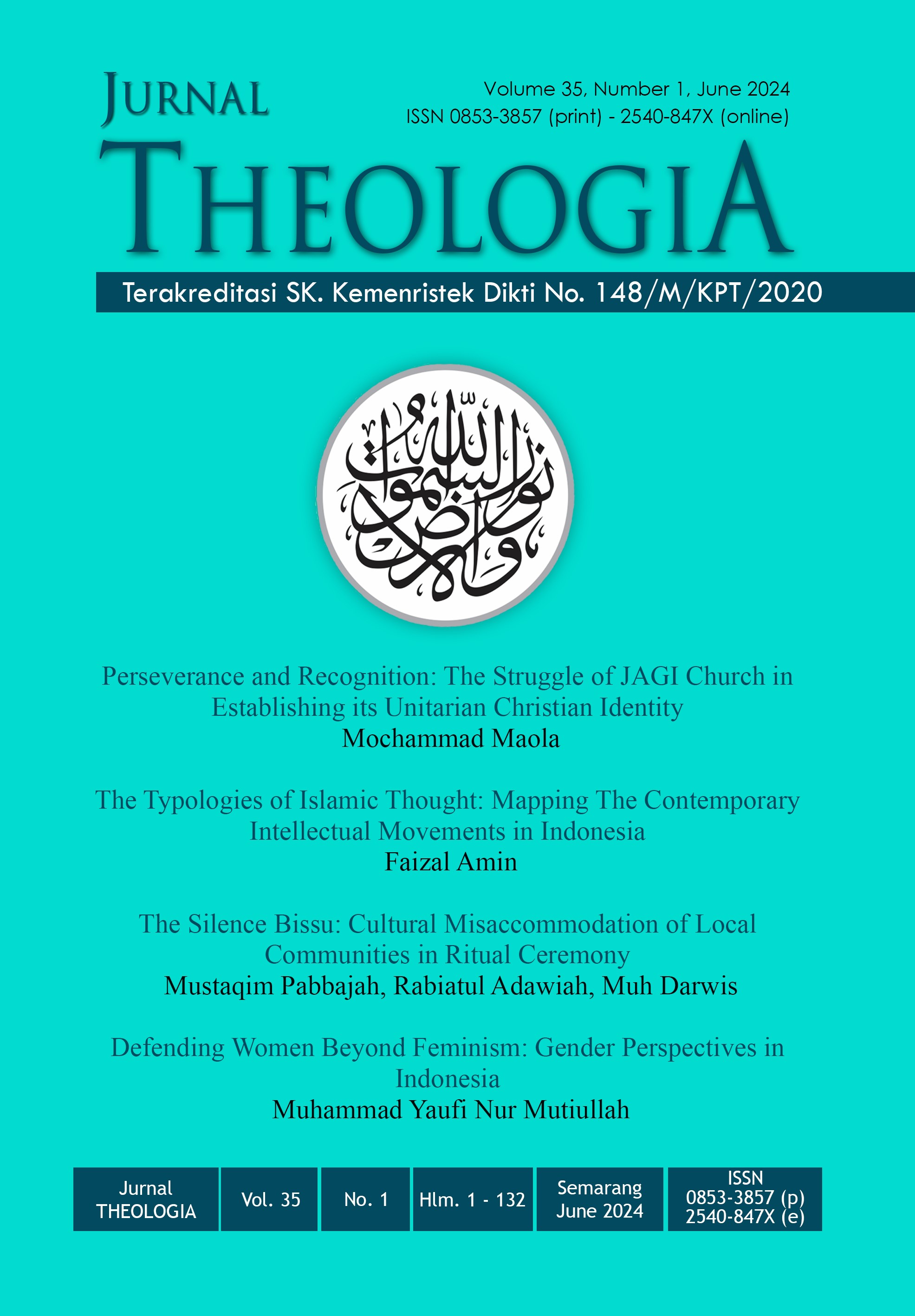Sentiment Analysis on Social Media and Stakeholders about Negative Issues Among Islamic Boarding School Community In Indonesia
DOI:
https://doi.org/10.21580/teo.2024.35.2.23164Keywords:
Islamic boarding school, Sentiment Analysis, Social Media, Negative IssuesAbstract
This study examines public sentiment towards Islamic boarding schools (pesantren) in Indonesia using Twitter data and interviews with pesantren stakeholders, including administrators (asatidz), students (santri), and the surrounding community. Sentiment analysis of Twitter data, collected using the hashtag #pondokpesantren in 2023, revealed that public sentiment is predominantly neutral, with fewer positive and negative opinions. The analysis, conducted using the K-Nearest Neighbors (k-NN) model, achieved 90% accuracy and an F1-Score of 89.9%, indicating reliable performance in classifying sentiment. On the other hand, interviews with pesantren stakeholders highlighted more nuanced issues, such as security concerns, educational autonomy, and disciplinary practices, which were not widely discussed on social media. The findings reveal a gap between public perceptions on Twitter, which tend to generalize pesantren issues, and stakeholders’ detailed, experience-based insights. This discrepancy underscores the need for open communication between pesantren and the public to address emerging concerns and improve pesantren’s education and security systems. By combining sentiment analysis and phenomenological interviews, this study provides a deeper understanding of public perceptions and the internal challenges faced by pesantren in Indonesia, offering valuable insights for future improvements in pesantren management and public engagement.
Downloads
References
Ali Uraidhi, Said, Muhammad Farhan Alfarisy, Ravi Rajesta Rasyid, Faculty of Social and Political Sciences, and Raja Ali Haji Maritime University. “Analysis of Sexual Violence Behavior in Islamic Boarding Schools (Analysis Study of Erving Goffman's Dramaturgy Theory)” 1, no. 4 (2023): 785–96.
Furqan, Mhd, Sriani Sriani, and Susan Mayang Sari. “Sentiment Analysis Using K-Nearest Neighbor Towards New Normal During Covid-19 In Indonesia.” Techno.Com 21, no. 1 (2022): 51–60. https://doi.org/10.33633/tc.v21i1.5446.
Giovani, Angelina Puput, Ardiansyah Ardiansyah, Tuti Haryanti, Laela Kurniawati, and Windu Gata. “Sentiment Analysis of Ruang Guru Application on Twitter Using Classification Algorithm.” Jurnal Teknoinfo 14, no. 2 (2020): 115. https://doi.org/10.33365/jti.v14i2.679.
KPAI Public Relations. “END VIOLENCE AGAINST CHILDREN IN BOARDING SCHOOL.” https://www.kpai.go.id/, 2023. https://www.kpai.go.id/publikasi/kpaisantri-ponpes-pasuruan-alami-kekerasan-dan-meninggal.
Lampung, Kompastv. “Hit by Immoral Issues, Hundreds of Santri Suddenly Leave Islamic Boarding School.” Kompas TV, 2022. https://www.kompas.tv/article/348926/diterpa-isu-asusila-ratusan-santri-mendadak-tinggalkan-pondok-Islamic boarding school.
Pravina, Arsya Monica, Imam Cholissodin, and Putra Pandu Adikara. “Sentiment Analysis of Airline Opinions on Twitter Documents Using Support Vector Machine (SVM) Algorithm.” Journal of Information Technology and Computer Science Development 3, no. 3 (2019): 2789–97. http://j-ptiik.ub.ac.id.
Setiawan, Wawan. “The Digital Era and Its Challenges.” National Seminar on Education, 2017, 1–9.
Styawati, Andi Nurkholis, Zaenal Abidin, and Heni Sulistiani. “Optimization of Support Vector Machine Parameters Based on Firefly Algorithm on Film Opinion Data.” RESTI Journal (System Engineering and Information Technology) 5, no. 5 (2021): 904–10. https://doi.org/10.29207/resti.v5i5.3380.
Sundara, Tri A, and Sherly Ekaputri Arnas. “Naïve Bayes Classifier for Sentiment Analysis of Radicalism Issues.” Proceedings of the National Seminar on Sisfotek (Information Systems and Information Technology), 2020, 93–98.
Syahrani, Syahrani. “The Role of Homeroom Teachers in Fostering Learning Discipline at the Anwarul Hasaniyyah (Anwaha) Islamic Boarding School, Tabalong Regency.” Al Qalam: Journal of Religious and Social Sciences 16, no. 1 (2022): 50. https://doi.org/10.35931/aq.v16i1.763.
Ali Uraidhi, Said, Muhammad Farhan Alfarisy, Ravi Rajesta Rasyid, Faculty of Social and Political Sciences, and Raja Ali Haji Maritime University. “Analysis of Sexual Violence Behavior in Islamic Boarding Schools (Analysis Study of Erving Goffman's Dramaturgy Theory)” 1, no. 4 (2023): 785–96.
Furqan, Mhd, Sriani Sriani, and Susan Mayang Sari. “Sentiment Analysis Using K-Nearest Neighbor Towards New Normal During Covid-19 In Indonesia.” Techno.Com 21, no. 1 (2022): 51–60. https://doi.org/10.33633/tc.v21i1.5446.
Giovani, Angelina Puput, Ardiansyah Ardiansyah, Tuti Haryanti, Laela Kurniawati, and Windu Gata. “Sentiment Analysis of Ruang Guru Application on Twitter Using Classification Algorithm.” Jurnal Teknoinfo 14, no. 2 (2020): 115. https://doi.org/10.33365/jti.v14i2.679.
KPAI Public Relations. “END VIOLENCE AGAINST CHILDREN IN BOARDING SCHOOL.” https://www.kpai.go.id/, 2023. https://www.kpai.go.id/publikasi/kpaisantri-ponpes-pasuruan-alami-kekerasan-dan-meninggal.
Lampung, Kompastv. “Hit by Immoral Issues, Hundreds of Santri Suddenly Leave Islamic Boarding School.” Kompas TV, 2022. https://www.kompas.tv/article/348926/diterpa-isu-asusila-ratusan-santri-mendadak-tinggalkan-pondok-Islamic boarding school.
Pravina, Arsya Monica, Imam Cholissodin, and Putra Pandu Adikara. “Sentiment Analysis of Airline Opinions on Twitter Documents Using Support Vector Machine (SVM) Algorithm.” Journal of Information Technology and Computer Science Development 3, no. 3 (2019): 2789–97. http://j-ptiik.ub.ac.id.
Setiawan, Wawan. “The Digital Era and Its Challenges.” National Seminar on Education, 2017, 1–9.
Styawati, Andi Nurkholis, Zaenal Abidin, and Heni Sulistiani. “Optimization of Support Vector Machine Parameters Based on Firefly Algorithm on Film Opinion Data.” RESTI Journal (System Engineering and Information Technology) 5, no. 5 (2021): 904–10. https://doi.org/10.29207/resti.v5i5.3380.
Sundara, Tri A, and Sherly Ekaputri Arnas. “Naïve Bayes Classifier for Sentiment Analysis of Radicalism Issues.” Proceedings of the National Seminar on Sisfotek (Information Systems and Information Technology), 2020, 93–98.
Syahrani, Syahrani. “The Role of Homeroom Teachers in Fostering Learning Discipline at the Anwarul Hasaniyyah (Anwaha) Islamic Boarding School, Tabalong Regency.” Al Qalam: Journal of Religious and Social Sciences 16, no. 1 (2022): 50. https://doi.org/10.35931/aq.v16i1.763.
Downloads
Published
How to Cite
Issue
Section
License
Copyright (c) 2024 Jurnal Theologia

This work is licensed under a Creative Commons Attribution-NonCommercial-ShareAlike 4.0 International License.




















